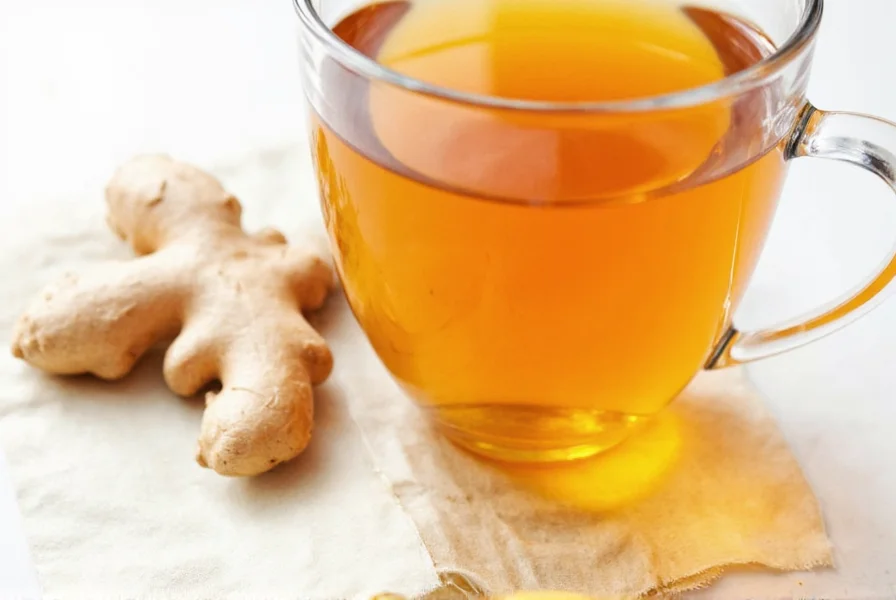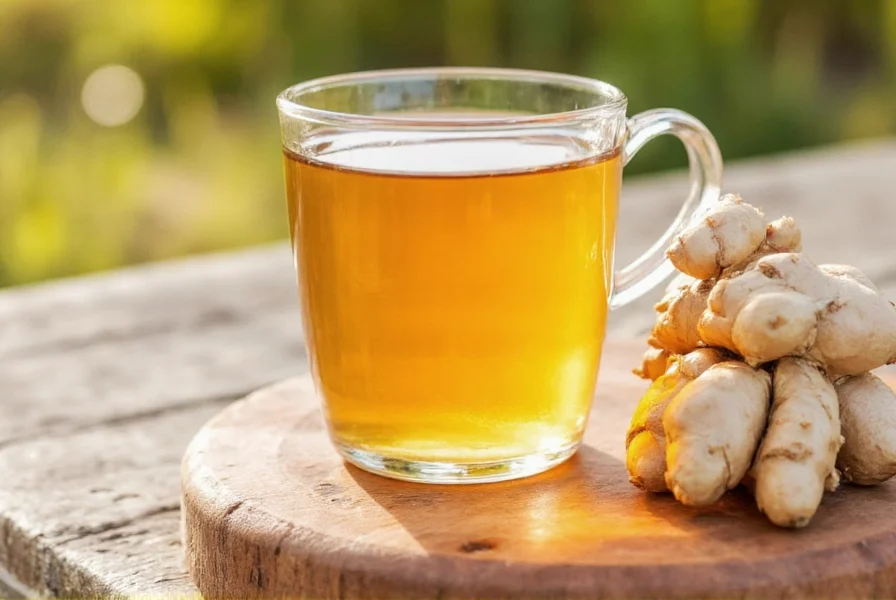Acid reflux affects millions of people worldwide, causing uncomfortable symptoms like heartburn, regurgitation, and chest pain. As more individuals seek natural alternatives to conventional medications, ginger tea has emerged as a popular home remedy. This article examines the scientific evidence behind ginger tea for acid reflux relief, proper preparation methods, potential benefits and risks, and how it compares to other natural approaches.
The Science Behind Ginger and Acid Reflux
Ginger (Zingiber officinale) contains bioactive compounds like gingerols and shogaols that have demonstrated anti-inflammatory and antioxidant effects in numerous studies. Research published in the Molecular Research and Food Nutrition journal found that ginger can accelerate gastric emptying by up to 25%, which may help reduce the likelihood of stomach contents flowing back into the esophagus.
A 2021 systematic review in the Journal of Gastroenterology and Hepatology analyzed multiple clinical trials examining ginger's effects on digestive disorders. The review concluded that ginger shows promise for managing functional dyspepsia and mild GERD symptoms, though more large-scale human studies specifically focused on acid reflux are needed.

How Ginger Tea May Help Acid Reflux Symptoms
Ginger tea offers several potential mechanisms for alleviating acid reflux:
- Accelerated gastric emptying: By helping the stomach empty more efficiently, ginger may reduce pressure that contributes to reflux episodes
- Anti-inflammatory properties: Ginger's compounds may reduce inflammation in the esophageal lining aggravated by acid exposure
- Digestive enzyme stimulation: Ginger appears to stimulate production of digestive enzymes that improve overall digestion
- Nausea reduction: For those experiencing reflux-related nausea, ginger's well-documented antiemetic effects can provide additional relief
| Benefit | Scientific Support | Recommended Timing |
|---|---|---|
| Accelerates gastric emptying | Strong (multiple studies) | 30 minutes before meals |
| Reduces esophageal inflammation | Moderate (animal studies) | Between meals |
| Decreases nausea | Strong (clinical evidence) | As needed |
| Improves overall digestion | Moderate | After meals |
Potential Risks and Considerations
While many find ginger tea beneficial for acid reflux, it's not universally helpful. Some individuals report worsened symptoms, particularly when consuming:
- Excessive amounts (more than 4 grams of ginger daily)
- Strongly concentrated ginger tea
- Ginger tea close to bedtime (when lying down can exacerbate reflux)
- Ginger combined with other potential triggers like caffeine or citrus
People taking blood thinners, diabetes medications, or certain heart medications should consult their physician before regularly consuming ginger tea, as it may interact with these medications. Those with gallstones should also exercise caution, as ginger may stimulate bile production.
How to Prepare Ginger Tea for Acid Reflux Relief
For optimal results when using ginger tea for acid reflux, preparation matters. Here's a science-backed method:
- Use fresh ginger root rather than powdered ginger for better control of strength
- Peel and thinly slice 1-2 inches of ginger root
- Simmer in 2 cups of water for 10-15 minutes (longer simmering increases potency but may increase risk of irritation)
- Strain and allow to cool slightly before drinking
- Add a small amount of honey if desired (avoid citrus additions which may trigger reflux)
For best results with acid reflux, consume ginger tea 20-30 minutes before meals to prepare your digestive system, or between meals when symptoms occur. Avoid drinking it within 3 hours of bedtime to prevent nighttime reflux episodes.

When Ginger Tea Might Worsen Acid Reflux
Research suggests ginger tea may exacerbate symptoms in certain situations:
- High concentrations: Very strong ginger tea can irritate the esophageal lining in sensitive individuals
- Late evening consumption: Drinking ginger tea close to bedtime may increase nighttime reflux
- With other triggers: Combining ginger tea with coffee, alcohol, or spicy foods may negate potential benefits
- For severe GERD: Those with erosive esophagitis or Barrett's esophagus may not benefit from ginger alone
If you experience increased heartburn after trying ginger tea, discontinue use. This doesn't mean ginger is harmful—it simply may not be the right remedy for your specific physiology or reflux triggers.
Complementary Natural Approaches to Acid Reflux
Ginger tea works best as part of a comprehensive approach to managing acid reflux. Consider combining it with these evidence-based strategies:
- Elevating the head of your bed 6-8 inches to prevent nighttime reflux
- Avoiding large meals within 3 hours of bedtime
- Identifying and eliminating personal trigger foods through an elimination diet
- Maintaining a healthy weight to reduce abdominal pressure
- Practicing stress reduction techniques, as stress can exacerbate reflux symptoms
When to Consult a Healthcare Professional
While ginger tea may help with occasional mild heartburn, consult a healthcare provider if you experience:
- Symptoms more than twice weekly
- Difficulty swallowing
- Unintended weight loss
- Chest pain that radiates to your arm or jaw
- Symptoms that persist despite lifestyle changes and natural remedies
Chronic acid reflux (GERD) requires proper medical evaluation and treatment. Natural remedies like ginger tea should complement—not replace—professional medical care for persistent symptoms.
Conclusion
Ginger tea represents a promising natural option for managing mild, occasional acid reflux symptoms for many individuals. The scientific evidence supporting ginger's digestive benefits is encouraging, though individual responses vary significantly. When prepared correctly and consumed at appropriate times, ginger tea can be a valuable component of a holistic approach to reflux management. Remember that what works for one person may not work for another, so pay attention to your body's responses and consult healthcare professionals for persistent or severe symptoms.
Frequently Asked Questions
Does ginger tea help with acid reflux immediately?
Ginger tea may provide some relief within 15-30 minutes for mild symptoms due to its anti-inflammatory properties and ability to promote gastric emptying. However, it's not an immediate antacid like over-the-counter medications. For best results, consume ginger tea preventatively before meals rather than waiting for symptoms to become severe.
How much ginger tea should I drink for acid reflux?
For acid reflux management, limit ginger tea to 1-2 cups daily, using 1-2 inches of fresh ginger root per cup. Consuming more than 4 grams of ginger daily may increase the risk of stomach irritation and potentially worsen reflux symptoms. Start with a weaker preparation and gradually increase strength if well-tolerated.
Can I add lemon to ginger tea for acid reflux?
Adding lemon to ginger tea is generally not recommended for acid reflux sufferers, as citrus can lower the pH of stomach contents and potentially worsen symptoms. While some believe lemon has alkalizing effects, the initial acidity can trigger reflux in sensitive individuals. If you want additional flavor, consider a small amount of honey instead.
Is fresh ginger better than ginger supplements for acid reflux?
Fresh ginger in tea form is generally preferred over supplements for acid reflux management. Tea allows for better control of concentration and provides hydration benefits. Supplements often contain concentrated ginger extracts that may be too potent for sensitive digestive systems. The warm liquid of tea may also have soothing effects that supplements lack.
How long does it take for ginger tea to work for acid reflux?
Some people notice improvement in mild symptoms within 15-30 minutes of drinking ginger tea, but for more consistent results, regular consumption over 2-4 weeks is typically needed. Ginger works by supporting overall digestive function rather than providing immediate symptom suppression. Track your symptoms to determine if ginger tea is effective for your specific reflux pattern.











 浙公网安备
33010002000092号
浙公网安备
33010002000092号 浙B2-20120091-4
浙B2-20120091-4